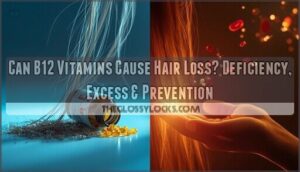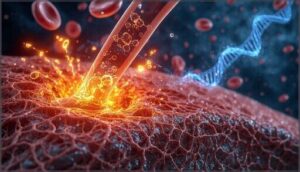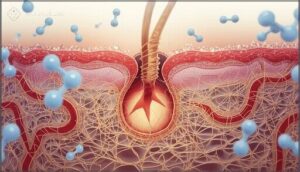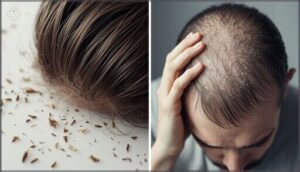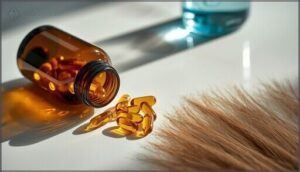This site is supported by our readers. We may earn a commission, at no cost to you, if you purchase through links.
Most people don’t realize that B12 deficiency, not B12 supplementation itself, usually causes hair loss, though the confusion between the two drives countless worried searches each month. When your body lacks adequate cobalamin, red blood cell production falters, oxygen delivery to your scalp diminishes, and hair follicles enter a prolonged shedding phase that manifests as diffuse thinning across your crown and temples.
The good news is that B12-related hair loss generally reverses once you restore your levels through targeted dietary changes or clinician-guided supplementation. However, understanding the distinction between deficiency-driven shedding and the unfounded fear that B12 vitamins themselves cause hair loss requires a closer look at how this essential nutrient actually influences follicle function and growth cycles.
Table Of Contents
- Key Takeaways
- Can B12 Vitamins Cause Hair Loss?
- How B12 Deficiency Impacts Hair Health
- Can Too Much B12 Cause Hair Loss?
- Preventing Hair Loss With Proper B12 Intake
- Frequently Asked Questions (FAQs)
- What are the negatives to taking B12?
- Can vitamin B12 deficiency cause hair loss?
- What vitamins can be taken to reduce hair loss?
- Does vitamin B2 cause hair loss?
- Does vitamin B12 reduce hair shedding?
- How do I know if my hair loss is B12-related?
- Does vitamin A cause hair loss?
- Can too much B12 make your hair fall out?
- Do B12 and vitamin D cause hair loss?
- How does vitamin B12 hair loss look like?
- Conclusion
Key Takeaways
- B12 deficiency, not B12 supplementation, causes hair loss by impairing red blood cell production and reducing oxygen delivery to hair follicles, which triggers diffuse thinning across the crown and temples.
- Hair loss from B12 deficiency typically reverses within months once you restore adequate levels through targeted dietary changes or clinician-guided supplementation, as follicles resume normal growth cycles.
- Excessive B12 intake rarely causes hair loss in healthy adults because the body excretes surplus amounts through urine, though very high doses may trigger minor side effects like gastrointestinal upset or skin reactions.
- You can prevent B12-related hair thinning by consuming animal-based foods like clams, liver, and fatty fish or using fortified products and supplements when dietary sources fall short, particularly if you’re older or have malabsorption conditions.
Can B12 Vitamins Cause Hair Loss?
The relationship between vitamin B12 and hair loss isn’t always straightforward, and it’s easy to find conflicting information about whether B12 causes or prevents thinning hair.
Fortunately, identifying and addressing hair thinning prevention methods early can help restore thickness and promote healthier growth.
To understand what’s actually happening, you need to separate the scientific evidence from common misconceptions and recognize the specific patterns that signal a B12-related problem.
Let’s examine what research tells us about this connection, what myths continue to circulate, and how hair loss from B12 issues usually presents itself.
Scientific Evidence Linking B12 and Hair Loss
How does vitamin B12 deficiency actually connect to hair loss? The research centers on B12’s role in DNA synthesis and red blood cell production, both critical for hair follicle function.
When deficiency develops, nutrient absorption falters, and oxygen delivery to your scalp diminishes, potentially triggering:
- Diffuse thinning when anemia reduces follicle oxygen supply
- Weaker hair shafts prone to breakage
- Prolonged shedding phases disrupting normal growth cycles
- Shortened anagen phases producing thinner, shorter strands
A more detailed explanation of the role of vitamin B12 in hair growth is available for those seeking further information.
Myths and Misconceptions About B12 Supplements
Despite the clear link between B12 deficiency and hair loss, misconceptions about supplementation abound. Many assume that high-dose vitamin supplements automatically reverse thinning, overlooking how B12 absorption depends on intrinsic factor and individual physiology.
Others believe more is always better, but excess intake rarely improves hair health in non-deficient individuals. Understanding proper dosage guidelines and nutrient balance helps you avoid unrealistic expectations about supplementation.
Hair Loss Patterns Associated With B12 Issues
When B12 deficiency disrupts oxygen delivery to your scalp, you’ll usually notice diffuse thinning across the crown rather than isolated bald spots, a pattern that differs from genetic hair loss. Telogen effluvium-style shedding often emerges alongside fatigue and pallor, signaling anemia’s impact on hair follicle health. Red blood cell dysfunction diminishes nutrient delivery, weakening hair shafts and triggering widespread shedding. It’s important to address as early as possible to restore healthy hair growth.
Combining B12 supplementation with strategies to stop hair thinning can help reverse telogen effluvium by restoring both nutrient levels and follicle function.
- Thinning spreads across your crown as oxygen-starved follicles struggle to sustain growth
- Hair shafts become brittle and break easily when B12 deficiency reduces keratin synthesis
- Recovery occurs gradually after restoring B12 levels, with density improvements visible over months
How B12 Deficiency Impacts Hair Health
When your B12 levels drop below what your body needs, your hair follicles don’t get the support they require to function properly. This nutritional shortfall can disrupt the normal hair growth cycle, leading to noticeable changes in your hair’s thickness and vitality.
Understanding how B12 deficiency affects your hair involves looking at three key areas: the role B12 plays in follicle function, how low levels interfere with growth cycles, and the specific symptoms that signal a problem.
B12’s Role in Hair Follicle Function
Your hair follicles run on cellular energy generated through B12 metabolism, which powers the rapid cell division needed for keratin synthesis and strand production.
When vitamin B12 deficiency occurs, follicle functioning weakens because oxygen delivery to scalp tissue drops and nucleotide pools shrink, directly disrupting hair growth.
This metabolic slowdown translates into visible hair loss over time.
Effects of Low B12 on Hair Growth Cycle
Disruption of nutrient delivery systems marks the primary mechanism by which low cobalamin levels alter your natural Hair Growth cycle. When B12 Deficiency develops, several measurable changes occur:
- Reduced Scalp Oxygenation Levels force follicles into premature telogen phase, increasing shedding
- Weakened keratin cross-linking produces brittle, breakage-prone strands
- Impaired protein synthesis slows anagen progression, shortening active growth duration
- Diminished cellular energy inhibits rapid division in hair matrix cells
- Systemic anemia compounds Hair Loss by limiting oxygen transport to follicle roots
These alterations create diffuse thinning patterns rather than localized bald patches, distinguishing B12 Deficiency Symptoms from other Hair Growth Patterns linked to Nutritional Deficiencies affecting Hair Follicle Health.
Symptoms of Hair Loss Due to B12 Deficiency
Recognition of specific B12 Deficiency signs helps you distinguish true nutrient-driven Hair Loss from other causes. You’ll notice diffuse Hair Thinning Patterns across your crown and temples as Follicle Damage progresses, often accompanied by brittle strands that break easily.
Anemia Symptoms—fatigue, paleness, dizziness—frequently coincide with these changes, while Scalp Irritation or flakiness may develop alongside systemic Vitamin Deficiency and Hair Loss manifestations requiring prompt nutritional correction.
Can Too Much B12 Cause Hair Loss?
While B12 deficiency can contribute to hair loss, you might wonder if taking too much of this vitamin could have the opposite effect. Vitamin B12 is generally considered safe because it’s water-soluble, meaning your body usually excretes excess amounts through urine.
However, understanding the potential risks of high-dose supplementation, reported side effects, and what current research reveals about overconsumption can help you make informed decisions about your B12 intake.
Risks of Excessive B12 Intake
You might assume B12 toxicity isn’t a real concern since it’s water-soluble, but high dose risks do exist. Excessive B12 intake can trigger gastrointestinal upset, skin reactions like acne flares, and potential B12 interactions with medications you’re taking.
Observational data links very elevated plasma levels to increased mortality in some populations, making overdose prevention important for your health.
Reported Side Effects of High-Dose B12
High dose B12 rarely produces severe toxicity, but you should monitor your response to supplementation, since individual B12 overdose symptoms range from skin reactions to digestive distress. Watch for these documented high dose risks:
- Injection site redness, warmth, or swelling persisting up to 72 hours
- Nausea, diarrhea, or mild abdominal cramping after rapid oral intake
- Tingling sensations in extremities accompanying excessive consumption
- Headaches, dizziness, or sleep disturbances in isolated cases
Current Research on B12 Overconsumption and Hair
You won’t find solid evidence that B12 overconsumption directly triggers hair loss in healthy adults. Current data shows high-dose B12 supplementation lacks consistent association with increased shedding when your baseline B12 status remains normal. Real-world case reports linking B12 toxicity to scalp health issues remain rare, uncontrolled, and largely unreplicated in clinical trials.
| Research Focus | Key Finding | Clinical Implication |
|---|---|---|
| B12 overconsumption and hair regrowth | No dose-dependent acceleration | Excess B12 doesn’t speed follicle cycling |
| Vitamin interactions affecting nutrient balance | Iron and zinc deficiencies confound results | Address multiple deficiencies, not B12 alone |
| Hair loss patterns in normal B12 levels | Androgenic alopecia and telogen effluvium predominate | B12 excess doesn’t create distinctive shedding |
| Supplementation and dietary intake versus deficiency | Correction of vitamin B12 deficiency improves thinning | Repletion benefits only those with confirmed low levels |
Preventing Hair Loss With Proper B12 Intake
You don’t need to leave hair health up to chance regarding vitamin B12. By focusing on the right dietary choices, understanding when supplementation makes sense, and supporting your body with overall nutritional balance, you can address B12-related hair concerns before they start.
Let’s look at practical steps you can take to maintain adequate B12 levels and promote healthy hair growth.
Dietary Sources of Vitamin B12
You can meet your vitamin B12 dietary needs through a variety of food sources, especially animal-based options that boost nutrient absorption effectively. Consider incorporating these rich sources into your dietary intake:
- Clams and oysters deliver outstanding B12, with clams providing over 84 micrograms per 3-ounce serving
- Beef or lamb liver supplies 70 to 90 micrograms per portion
- Fatty fish like salmon and tuna offer 4 to 9 micrograms per serving
- Fortified foods including cereals and plant milks support vegan and vegetarian diets with 6 to 12 micrograms
- Dairy products and eggs contribute modest amounts, around 0.6 to 2 micrograms daily
B12 Supplementation Guidelines
When dietary sources fall short, B12 supplementation becomes necessary, particularly for those with diagnosed deficiency or malabsorption issues. Adults generally require 2.4 micrograms daily, though pregnancy and lactation increase needs to 2.6 and 2.8 micrograms, respectively.
Supplementation strategies vary based on severity and absorption capacity:
| Route | Typical Use |
|---|---|
| Oral supplements (1-5 mg daily) | Reversible deficiency, dietary insufficiency |
| Intramuscular injections | Severe deficiency, malabsorption conditions |
| High-dose oral therapy | Bypassing mild absorption issues |
| Sublingual products | Alternative delivery, similar absorption |
Absorption efficiency decreases with age and certain gastrointestinal conditions, so older adults and individuals with pernicious anemia often require higher doses or injections. Your clinician can determine the most appropriate regimen and monitor your serum B12 levels to confirm treatment effectiveness, as hematologic and neurologic improvements may take weeks to manifest.
Tips for Maintaining Healthy Hair Through Nutrition
Beyond supplementation, optimizing nutrient balance fosters hair health through dietary planning that tackles multiple pathways simultaneously. A thorough nutrition therapy approach considers protein intake (0.8–1.2 grams per kilogram body weight), omega-three fatty acids from fatty fish, and adequate iron paired with vitamin C for absorption. Hair growth and nutrition remain interconnected, as follicle cells require consistent nutrient delivery for sustained hair health.
Your scalp thrives when you consistently provide:
- Quality protein from eggs, fish, and legumes to build keratin-rich strands
- Iron-rich greens paired with citrus to combat nutrient deficiency-related shedding
- Zinc from nuts and seeds, supporting follicle repair and preventing thinning
- Adequate hydration (six to eight glasses daily) to reduce shaft brittleness
- Biotin, B6, B12, and folate working synergistically through varied dietary intake
Hair supplements may fill gaps, but whole-food sources deliver cofactors that isolated nutrients can’t replicate, ensuring your healthy scalp receives comprehensive support for resilient growth.
Frequently Asked Questions (FAQs)
What are the negatives to taking B12?
Most people tolerate B12 well, but excessive doses can trigger gastrointestinal upset, headaches, or rare allergic reactions.
High intakes without deficiency may not provide added benefits and could complicate nutrient balance.
Can vitamin B12 deficiency cause hair loss?
Yes, vitamin B12 deficiency can cause hair loss. Low cobalamin levels impair red blood cell formation, reducing oxygen delivery to your scalp, which disrupts the hair growth cycle and may lead to thinning or shedding.
What vitamins can be taken to reduce hair loss?
Your hair thrives when you address vitamin B12 deficiency alongside iron, biotin, vitamin D, and other B vitamins.
Ensuring balanced nutrient delivery aids hair growth, scalp health, and peak hair follicle function through dietary supplements or fortified foods.
Does vitamin B2 cause hair loss?
Riboflavin deficiency, rather than excess intake, is associated with hair thinning and brittle strands. This is due to reduced energy production in hair follicles and impaired iron absorption, which limits oxygen delivery to scalp cells.
Does vitamin B12 reduce hair shedding?
Vitamin B12 aids red blood cell production that delivers oxygen to hair follicles. Restoring depleted levels can help normalize your hair growth cycle, reducing shedding when B12 deficiency was the underlying cause.
How do I know if my hair loss is B12-related?
Cracking the B12 code requires detective work: you’ll usually see accompanying fatigue, tingling extremities, or a sore tongue alongside diffuse thinning, while diagnostic tests revealing low serum cobalamin or elevated methylmalonic acid confirm nutrient imbalance.
Does vitamin A cause hair loss?
Yes, excessive intake can push hair follicles into the resting phase, triggering hair shedding. Retinol effects from high-dose supplements may cause temporary thinning, while Vitamin A toxicity often presents with skin symptoms alongside hair changes.
Can too much B12 make your hair fall out?
Excess vitamin B12 intake is unlikely to trigger hair shedding, as your body excretes unused amounts through urine, though very high levels may interact with other nutrients affecting hair health.
Do B12 and vitamin D cause hair loss?
When nutrient deficiencies occur together, they can compound hair loss effects. B12 deficiency may trigger thinning through impaired cell division, while low vitamin D disrupts follicle cycling, increasing shedding when levels drop markedly.
How does vitamin B12 hair loss look like?
B12 deficiency usually manifests as diffuse thinning across the scalp, particularly along the crown and temples. Increased shedding during washing or brushing, finer hair texture, and occasional scalp irritation accompany reduced follicle health.
Conclusion
The very vitamin that prevents hair loss is the one people fear might cause it, yet this paradox dissolves when you understand that can b12 vitamins cause hair loss only when they’re absent, not present.
Your follicles depend on adequate cobalamin for oxygen delivery and cellular renewal, which means maintaining ideal B12 levels through diet or clinician-supervised supplementation protects your hair rather than threatens it.
Test your levels, address deficiencies promptly, and watch your strands respond.
- https://www.nhs.uk/conditions/vitamin-b12-or-folate-deficiency-anaemia/
- https://www.ncbi.nlm.nih.gov/pmc/articles/PMC6380979/
- https://www.plymouthhospitals.nhs.uk/display-pil/pil-vitamin-b12-diet-sheet-5865/
- https://pmc.ncbi.nlm.nih.gov/articles/PMC6380979/
- http://www.webmd.com/diet/vitamin-b12-deficiency-symptoms-causes

